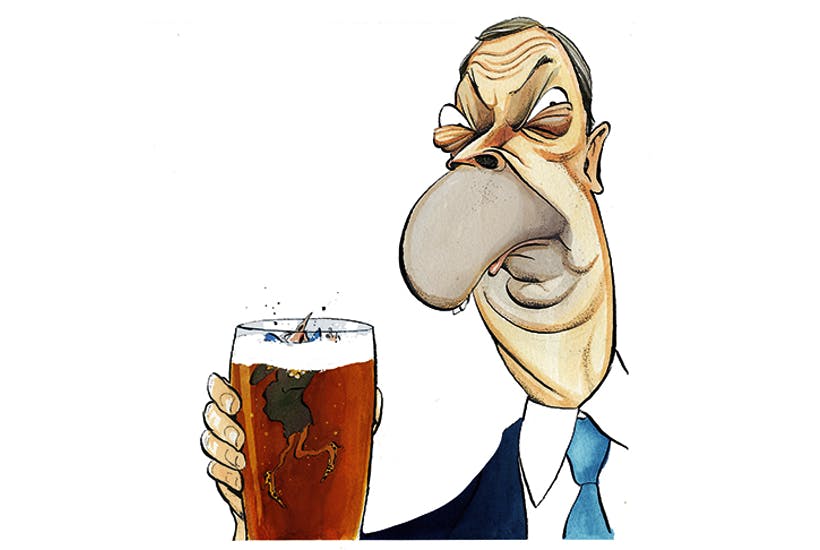Almost half of Tory supporters think that Nigel Farage deserves a peerage, according to a new poll. And while some 53 per cent of the overall public are said to oppose the elevation of Farage to the Lords, if anyone does deserve to become a peer the Brexit party leader should certainly make the shortlist.
Elevation to the Lords is meant to be an exceptional honour for exceptional people. This, of course, isn’t always the case. Over recent decades it has all too often been a reward for reliable placemen who have done a party leader’s bidding with such obsequiousness that not sending them down the corridor to wallow in pomposity becomes unthinkable.
On this former criterion – making an exceptional contribution – there can be no question of Farage’s claim to a lordship. Without the vehicle of a major political party to assist him, he has changed the course of events, forcing the issue of the UK’s membership of a transnational political union to the top of the agenda, despite the constant efforts of the entire establishment to keep it at the margins.
As one of those who featured for a while in his rolling cast of supporting actors, I naturally would not say he has done this “single-handedly”. But there can be no dispute that it would not have happened without him or that he has been the leading man.
For all those who accept that the UK leaving the EU is the biggest political change of the past forty years – which surely most would agree it is – there can be no logical claim that Farage does not merit a peerage. Only the most resolute and narrow-minded tribalists – those who insist nobody of any other viewpoint deserves any elevation ever – could say that Farage doesn’t deserve a seat in the Lords.
Farage’s early adoption of the cause of Donald Trump, something I confess to having found baffling and objectionable at the time, has also raised him to the status of someone who can be very useful to his country. Farage could be a helpful, informal channel of communication who is likely to receive a far warmer and more intimate hearing than many of the Foreign Office’s brigade of conventional thinkers.
And think, too, what an electrifying presence Lord Farage would be in the Upper Chamber, where debates on the great issues of the day have tended over recent years to be ever more subject to “groupthink” and ever more remote from public opinion.
I do not suppose for a second that Farage would import unamended the oratorical style he perfected in the European Parliament. Nobody would be getting called a “damp rag”. But he would be prepared to challenge orthodoxies and would also draw the best out of political adversaries.
Of course, Farage has indicated several times that he is not really in the market for a peerage but would be delighted with a knighthood. As the pre-eminent political swashbuckler of the age, knightly status would suit him rather well. But “Arise, Sir Nige” would short-change the nation. The outlook, ideas and experience he possesses would undoubtedly benefit the Palace of Westminster. Our first past the post electoral system means the Commons is out of reach. And yet here is a man who often speaks for millions of people who have been left to feel marginalised.
Nigel Farage led the campaign to force a referendum on EU membership. Early last year he rescued Brexit – not quite single-handedly but nearly – by forming the Brexit party ahead of the European elections.
In the years ahead, the British establishment as a whole will need to swing behind the proposition that Brexit was inevitable and right given the state of public opinion towards the prospect of further European political integration. Within it a core of advocates of the old order will carry on regarding Farage with stone cold fury, seeking to blackball him from any official recognition.
But those are the very same people who take that view of the Prime Minister too – and went on the airwaves to badmouth him throughout the recent general election campaign. Boris Johnson should not kowtow to them. He should not merely offer Nigel Farage a peerage at an early opportunity, he should actively seek to persuade him to accept one.







Comments